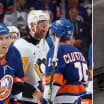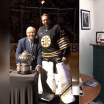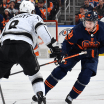MONTREAL-- When Hockey Hall of Famer Andy Bathgate is honored with a moment of silence before NHL games this weekend, a legend fondly remembered, there should be special reflection paid by goaltenders of every team, at every level.
For it was Bathgate, at New York's Madison Square Garden on Nov. 1, 1959, who played an instrumental role in forever changing the face of goaltending, bringing the mask into the game and saving the men in the nets their grim inventory of valley-deep cuts, spools of sutures, and eyes that were blackened, or worse, by shattered cheekbones.
Bathgate helped to change face of goaltending
His shot that hit Plante brought mask into hockey
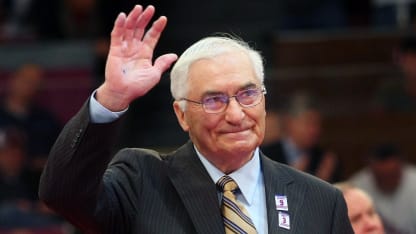
© Bruce Bennett/Getty Images
Bathgate, who died Friday at age 83, played 1,069 NHL games between 1952-53 and 1970-71, suiting up for the New York Rangers, Toronto Maple Leafs, Detroit Red Wings and, finally, the expansion Pittsburgh Penguins, for whom he scored the first goal in franchise history.
The silky stickhandler from Winnipeg, Manitoba, scored 349 goals and had 624 assists to earn his Hockey Hall of Fame induction. He won the Hart Trophy as the NHL's most valuable player with the Rangers in 1958-59, scoring 40 goals that season, and won the Stanley Cup with the Maple Leafs in 1964.
But it was a Bathgate shot that missed its target and yet hit precisely where he aimed it for which he would always be remembered; a puck that split wide-open the unmasked face of Montreal Canadiens goalie Jacques Plante.
After the game was delayed while the wound was stitched, Plante returned to his crease wearing a crude fibreglass mask he'd been using in practice, pulling it on for the first time in a game over the vehement protests of his coach, Toe Blake.
But Blake could hardly complain about the result; the Canadiens won 3-1 that night, then went on a lengthy unbeaten streak in front of the masked, confident Plante.
How fitting that both Bathgate and Plante would be inducted into the Hockey Hall of Fame in the Class of 1978, joined in the shrine as their lives have been inextricably linked for a single puck in one game going on six decades ago.
If you dismissed as an accident Bathgate's shot that changed hockey forever, wrote it off as an attempt that got away from the shooter, you would be absolutely wrong.
Bathgate went high on Plante on purpose, and he admitted as much for more than five decades after the historic game.
"It was deliberate on my part because of what he did to me," Bathgate told author Todd Denault in the latter's 2009 biography, "Jacques Plante: The Man Who Changed The Face of Hockey."
"He could have ended my career. I knew that I was just giving him a little love tap."
Plante had given an unsuspecting Bathgate, in full-speed pursuit of a puck deep in the Montreal end, a quick poke of his stick in the skates. Bathgate lost his footing and plowed headfirst into the boards, sustaining cuts to his cheek and ear. He skated off for stitches, infuriated and plotting his revenge.
"I thought to myself, 'OK, I can't fight [Plante] because the whole team would jump in on me,' " Bathgate told Denault. "So I went into the dressing room and quickly got stitched up."
It wasn't long before the Rangers forward, the Canadiens goalie, six ounces of vulcanized rubber and hockey history collided; Plante in a low crouch, trying to see through a forest of bodies, Bathgate knowing exactly what he wanted to do with the puck on his stick and with the skill to make it happen.
"[Plante's] head was sticking out there just like a chicken, just so he could see what was going on," Bathgate recalled.
The lore of the event speaks of a Bathgate slap shot, or a backhand, of a puck that rose sharply and unexpectedly to catch Plante in the face.
"It was actually a wrist shot," Bathgate told the goalie's biographer. "It wasn't a hard shot, but I tried to give it to him the same as me and I guess I caught him. It was a shot with feeling in it. It wasn't a blast and I wasn't trying to score because the angle was really bad. But his head was sticking out and I decided if he wanted to play those little games …"
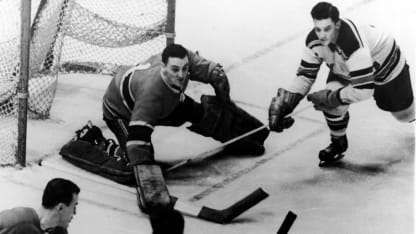
© B Bennett/Getty Images
Sliced open from the mouth to one nostril, Plante went down in a bloody heap and was helped to the Rangers clinic, where he was sewn up quickly enough that the Canadiens didn't have to use the "house goalie" at Madison Square Garden, an emergency standby of dubious ability who was available to either one-goalie team in the event of injury.
If the mask would be one of the pioneering Plante's defining moments, so too would it be part of the shooter's legacy.
Bathgate's role in defining the future of goaltending is a priceless page in his hockey story, but it is wholly unfair to remember him solely for a single shot that would not be one of the 26 goals he'd score for the Rangers that season.
His dear friend, fellow Rangers legend Harry Howell, hailed him as the greatest player to pull on that team's jersey.
"[Bathgate] was our star, our premier player, our marquee attraction, and deservedly so," Howell has said.
Bathgate stole the spotlight from Detroit Red Wings icon Gordie Howe on March 14, 1962, a night that saw the teams battling for the final berth in the Stanley Cup Playoffs, tied in points and both desperate for a win at the Garden.
Late in the second period, Howe scored his 500th career goal, beating Rangers goaltender Gump Worsley. Mr. Hockey's milestone triggered a standing ovation.
But Bathgate brought down the house midway through the third period when he scored on a penalty shot, a freebie that in fact should have been awarded to teammate Dean Prentice, to give the Rangers a 3-2 win and spark a hot finish that saw New York edge Detroit by four points for the last playoff spot.
From December 1962 through early January 1963, Bathgate scored in 10 consecutive games to establish a since-topped "modern-day" NHL record.
He was a leader everywhere he played, from the junior Guelph (Ontario) Biltmore Mad Hatters, through the NHL, his various semipro stops in Vancouver, Cleveland and Pittsburgh, and even a career-ending adventure in Switzerland.
Bathgate's other love was golf; he was a hugely popular figure at the driving range he opened on the outskirts of Toronto in the mid-1960s, after being traded to the Maple Leafs, as well as the nearby club he partnered in with old friends and Rangers teammates Howell and Vic Hadfield.
Of the 1,123 NHL games he would play, including playoffs, Bathgate most cherished Game 7 of the 1964 Stanley Cup Final, when he scored what would be the Cup-winning goal in the Maple Leafs' 4-0 victory against Detroit.
On this night, it was his shot over Terry Sawchuk's shoulder that sent Toronto on its way, threaded perfectly past the crouched goaltender's masked face into the net at Maple Leafs Gardens.
"Finally, I knew what it was like to win the Stanley Cup," Bathgate would say. "To hold it skyward, cradle it like a baby and hug it like a loved one."









